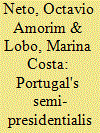| Srl | Item |
| 1 |
ID:
086765


|
|
|
|
|
| Publication |
2009.
|
| Summary/Abstract |
This article analyses the policy-making role of Portugal's heads of state in the period 1976-2006. Not only is Portugal rarely studied in the English language comparative literature, but there is no consensus concerning the proper definition of the country's system of government, whether it is semi-presidential or parliamentary. This article presents new data on the Portuguese president's role in the following areas: cabinet appointment and dismissal; parliamentary dissolution; ministerial appointments; referral of legislative bills to judicial review; veto powers; and agenda-setting through going-public tactics. It is concluded that the president's role in the policy process has never been irrelevant. While the 1982 constitutional reform did eliminate the possibility of undisguised presidential government, presidents have continued to be important in policy making, particularly due to use of their veto and dissolution powers. Therefore, the article argues that Portugal has remained solidly semi-presidential.
|
|
|
|
|
|
|
|
|
|
|
|
|
|
|
|
| 2 |
ID:
183838


|
|
|
|
|
| Summary/Abstract |
Defense ministers are among the most central players in democracies’ civil–military relations. This article aims to identify the determinants of the selection criteria of defense ministers in democracies and semi-democracies. More specifically, it attempts to measure the effects of systems of government on decisions to appoint civilians or military officers to head the defense ministry. We argue that some characteristics of presidentialized regimes lead to the appointment of military defense ministers. This is a novel contribution, one that connects the literature on civil–military relations and that on systems of government. To assess our hypothesis and its mechanisms, we use comprehensive cross-national data in 1975–2015. Our tests indicate a robust association between presidentialized systems of government and the appointment of military ministers. We also show that military defense ministers are associated with some relevant outcomes. These findings have important implications for the study of civil–military relations, defense policy, and democracy.
|
|
|
|
|
|
|
|
|
|
|
|
|
|
|
|